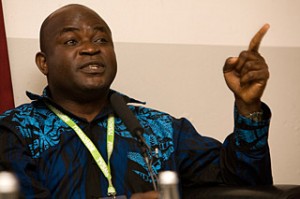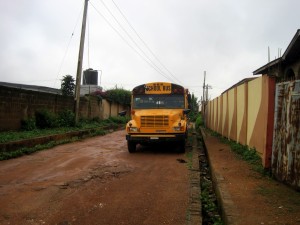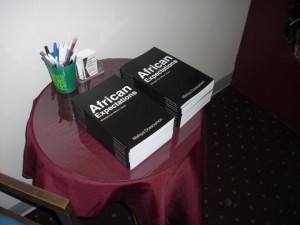Jahman Anikulapo was 50 on January 16, 2013. This period also coincides with his exiting a long, stellar career at Guardian newspaper group as the Sunday Editor. In the last two decades or so, Jahman has pressed his talent, position and material means to service in aid of the development of the cultural sector in Nigeria.
It is in light of the foregoing that the friends of Jahman Anikulapo, under the aegis of Committee of the Friends Of Jahman @50, have planned a month-long programme of events to celebrate this cultural agent. The Committee has now released the timetable for the celebrations, with the overall theme: ‘3D-Jahman: The Three Dimensions of a Cultural Change Agent – Artist, Activist and Art Journalist.’
Full Details of Events and Activities:
 January 13, 2013: Arthouse Forum
January 13, 2013: Arthouse Forum
Arthouse Forum For Jahman Anikulapo At 50: A panel conversation around how the Interplay between Art Advocacy, Art Journalism and Art Practice has shaped the evolution of cultural propagation in the last 25 years. This will be followed by two other events later that evening:
– Tributes and Readings For Jahman Anikulapo
– An evening of songs, theatre skits and performances
Time: From 4.pm.
Venues: Kongi’s Harvest Gallery (Second Floor), Freedom Park, Broad Street, Lagos.
RSVP: Ayodele Arigbabu (08033000499).
FRIDAY, 18th of January, 2013, 7PM
iREPRESENT INTERNATIONAL FILM DOCUMENTARY ( Friends of CORA) celebrates Jahman Anikulapo. Freedom Park, Broad Street, Lagos
RSVP: Sam Osaze 08036554119
January 20, 2013: Invitational Dinner
Jahman’s colleagues in the Guardian group of newspapers host him to an evening of dining and tributes.
RSVP: Andrew Iro Okungbowa (08023152195)
January 25, 2013: Stripped Bare: Jahman Anikulapo, Warts and All
The celebrant in an intimate conversation with a whistleblower about childhood, upbringing, between area-boyism and ajebotterhood, the promise of youth, the gap between expectations and middle age reality, hooliganism, the secrets of journalistic success, the challenges of advocacy, the hopes of culture advocacy, a peek into life after the Guardian.
Time: From 5pm.
Venue: Quintessence Book and Artshop, Falomo Shopping Centre
RSVP: Sam Osaze (08036554119).
It should be recalled that on December 30, 2012, Committee for Relevant Art (CORA) of which Jahman is Programme Chairman held a celebration for him at its annual year-end party in Festac Town, Lagos, at which there was a symbolic cutting of cake and a pouring of libation superintended by Mr. Benson Idonije, patriarch of Nigerian art critics.
Also, the artists Nkechi Nwosu-Igbo and Toni Kan have already launched call for submission into a poetry collection to be published in honour of Jahman Anikulapo, just as we understand that the call for contribution of papers into a festschrift for a similar purpose will be made in the next few days.
We look forward to your active participation in this season of celebrations.
Thank you.
Yours,
Deji Toye
 The Yoruba language lives today in Candomblé, a religion in Brazil, and in Cuba as Santería. Some of the cultures of the old Gold Coast have remained in Jamaica and some other parts of the Caribbean in sometimes recognizable bits, or sometimes in totally evolved forms. This is the inevitable fall-out of language and cultural transposition. As dead as Latin is, it still lives on in science and in the Catholic Church. The point is that even in the worst case scenario, there will still be a recognizable part of the language left.
The Yoruba language lives today in Candomblé, a religion in Brazil, and in Cuba as Santería. Some of the cultures of the old Gold Coast have remained in Jamaica and some other parts of the Caribbean in sometimes recognizable bits, or sometimes in totally evolved forms. This is the inevitable fall-out of language and cultural transposition. As dead as Latin is, it still lives on in science and in the Catholic Church. The point is that even in the worst case scenario, there will still be a recognizable part of the language left. A pretty moderate traffic situation on the city’s many roads. Today, there are more roads (due to increase in population) but the traffic situation on major roads have got far worse. I went back to Akobo a few months ago, and I was shocked at how many people now live there. The distance from IDC to Anifalaje used to disappear in minutes under the small steps of my rubber sandals. Now it looks farther than I remember, and the last time I walked it (just a few months ago), I returned home panting for air. And yet, I may have got a better deal than the people who remained on the road, in their cars – to slightly exaggerate the congestion that the place now faces because of traffic.
A pretty moderate traffic situation on the city’s many roads. Today, there are more roads (due to increase in population) but the traffic situation on major roads have got far worse. I went back to Akobo a few months ago, and I was shocked at how many people now live there. The distance from IDC to Anifalaje used to disappear in minutes under the small steps of my rubber sandals. Now it looks farther than I remember, and the last time I walked it (just a few months ago), I returned home panting for air. And yet, I may have got a better deal than the people who remained on the road, in their cars – to slightly exaggerate the congestion that the place now faces because of traffic. I find English a much simpler language for writing. French can become quite convoluted. My goal with African Expectations was not to write beautiful or intricate language but to convey ideas in the most direct and forceful manner as possible. I found the English language most suited to this requirement. Overall it was fairly easy to render the book purely in English but certain passages in the book, I have had to translate in my head from French to English. At this point, I mostly think and dream in English but sometimes I am unable to convey certain subtleties of thought directly in English. In those instances, I have had to think in French and translate to English. The translation part of the process has been a challenge because I have had to do research to make sure that what I wrote in English actually had the same meaning as the original thought.
I find English a much simpler language for writing. French can become quite convoluted. My goal with African Expectations was not to write beautiful or intricate language but to convey ideas in the most direct and forceful manner as possible. I found the English language most suited to this requirement. Overall it was fairly easy to render the book purely in English but certain passages in the book, I have had to translate in my head from French to English. At this point, I mostly think and dream in English but sometimes I am unable to convey certain subtleties of thought directly in English. In those instances, I have had to think in French and translate to English. The translation part of the process has been a challenge because I have had to do research to make sure that what I wrote in English actually had the same meaning as the original thought.